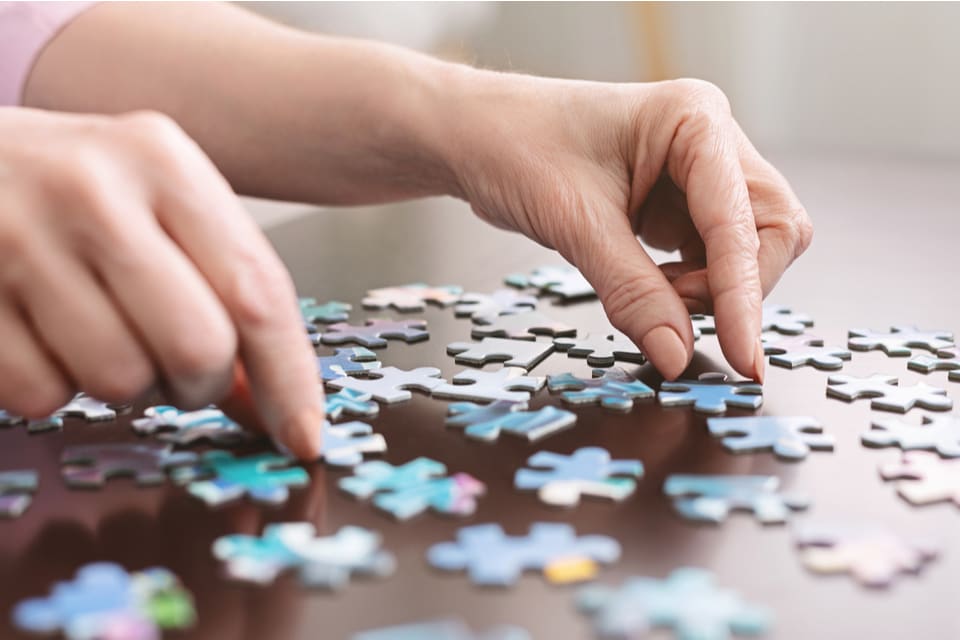
Best Brain Games and Apps to Keep Seniors’ Minds Sharp

Online brain training programs, applications, and games have been around since before the iPhone. Case in point, industry veteran Lumosity launched in 2005, and Steve Jobs announced the iPhone in 2007. Since that time, a slew of app makers have fielded their own products, but no company has cornered the market or driven down interest in classic pastimes like puzzles, cards and board games, some of which are also noted brain-function boosters.
Let our care assessment guide you
Our free tool provides options, advice, and next steps based on your unique situation.
Research has yet to definitively determine if brain puzzles, games, and training apps improve cognitive function, but some evidence suggests this may be the case. New studies continue to investigate, but even as they do, brain training applications continue to grow in popularity – top apps Elevate, Peak, and Lumosity have over 500,000 Apple App Store reviews combined.
So, whether you or a loved one prefers an app or a “real world” activity, it’s a safe bet there is benefit to picking an app or pastime that is noted as improving cognitive function: Even if hard gains in cognitive function cannot be proven, the joy of self-improvement is a reward unto itself.
5 best brain-training apps for seniors
Apps are seemingly everywhere now, and while you might not think there are any that would suit your taste or that of a loved one, the diversity is surprising. Some apps incorporate soothing tones and flatter color schemes that are calming and inviting – perfect for a senior loved one who might be beginning to experience the early symptoms of memory loss, dementia or Alzheimer’s. Below are five of the most-mentioned and most-exciting new apps ranked based on popularity, ease of use, and product support. They represent a range of design philosophies, so it is probably best to either explore them with a trusted friend or advisor or, if you are searching for a loved one, by yourself before recommending them:
- Lumosity is a longtime leader in the brain-training-app space and it has features that many other apps have copied. It offers a free version and numerous challenges that test memory, attention, flexibility and problem-solving skills through games, tasks, and other activities. Lumosity claims its efforts are driven by both in-house and external research, and it points to its involvement in 20 peer-reviewed studies. Used worldwide, it offers progress tracking and is an app that will suit those interested in one with a more scientific feel.
- Elevate has overtaken Lumosity in popularity. It differentiates itself by striving to improve users’ speech, writing, and reading and listening comprehension, which is probably why it ranks high among education apps. Like Lumosity, Elevate also offers progress tracking, but it feels at little more game-driven than the former. Lastly, Elevate shines on a large-format device, such as a tablet, perhaps making it a better choice for those with vision impairments.
- Brain Wars is for those with a competitive streak. This brain-training app aims to increase cognitive power and mental concentration through live challenges that seemingly never end, and its rules are straightforward and easy to learn quickly. Games include quick math, matching, tracing, and much more, and the interface is colorful and high contrast, but simple. The app allows you to play new challengers or friends through feature that allows users to connect with individuals worldwide. Like Elevate, Brain Wars is meant for larger, tablet-like devices.
- Peak is all about games, and its games have a sharper, almost arcade-like feel. One particularly fun one is a tile game in which players are shown danger tiles, those are then hidden, and the player must navigate around the danger tiles from one point to another from memory. Peak also offers performance tracking, a feature which is driven by graphics that resemble those in fitness trackers. In line with that, Peak differentiates itself by pairing each user with a virtual personal trainer called Coach. Coach motivates users by offering challenges such as new brain workouts and showing where and how they can improve.
- Happify is different from other brain-training apps in that it focuses primarily on general mental well-being, with games and activities that reduce burnout, help mitigate anxiety, and manage grief. This app may potentially benefit aging loved ones and caregivers alike. Happiness influences the brain’s ability to grow, expand, and improve. Keeping your mental health in check correlates directly with mental sharpness and cognitive function.
Mind games for seniors: no app required
Online programs
If a desktop computer or laptop are more to you or a loved one’s liking, there are several online programs that also offer a simple, yet effective way to boost cognitive abilities and memory skills.

Let our care assessment guide you
Our free tool provides options, advice, and next steps based on your unique situation.
- AARP’s Staying Sharp online brain health program takes a lifestyle-based approach to brain health. This platform requires an AARP membership. It creates plans that incorporate new behaviors and activities – such as daily acts of kindness, meditation, reflective writing, simple arts activities and more – into the user’s daily routine. For a fee, users can obtain personalized recommendations when they take a Brain Health Assessment. This assessment provides what AARP calls a “brain health score” and provides insights into how lifestyle affects a person’s brain health.
- Queendom is a site primarily focused on personality, aptitude, and IQ tests, but it also offers health, skill and cognitive function tests. Some quizzes are just for fun, but many can be a useful way to learn about ourselves or developing a better understanding of others. Many Queendom tests also focus on improving skills in decision making, problem solving, creativity and self-confidence.
- WebSudoku is a free Sudoku site with billions of free puzzles available. The game has been around since the late 1700s, and this online version offers a free, low-fi experience with easy, medium, hard, and “evil” difficulty levels. Sudoku tests logical thinking processes and number skills, and it can encourage greater agility and speed in both cases.
Puzzles and games
Puzzles exercise both sides of the brain, so players get a solid mental workout. While the left side of the brain may control logical thinking, the right side is generally believed to control creativity (though the brain’s hemispheres may be more fluid than previously believed). Working on a simple puzzle can help improve virtually any cognitive skill — from problem solving and logical reasoning to artistic ability and intuitiveness. Crosswords, word searches, dominoes and jigsaw puzzles all fall into this category.
Card games are also an excellent way to test math, memory, and strategic thinking skills. Bridge, Go Fish, Gin Rummy, and Uno all fit the bill. Uno has the added benefit of being a great game to play with young players, such as grandchildren or other relatives, too.
As with puzzles and card games, playing board games aids in memory formation and complex thought processes. Board games are another great way to practice decision making, strategic thinking and problem solving. Checkers, Chess, Snakes and Ladders, Scrabble, and Bingo are all great choices.
Some of these games also offer a great way to connect and stave off the negative effects of isolation in seniors. They may lower stress levels, increase social awareness, and may even help prevent cognitive decline.

Talk with a Senior Living Advisor
Our advisors help 300,000 families each year find the right senior care for their loved ones.
Sources
Baylor College of Medicine blogs: “A perfect match: The health benefits of jigsaw puzzles.”
Scientific American: “Does ‘Brain Training’ Actually Work?”
Inc.: “Come On, Get Happy: How Happiness Can Boost Your Brain to Think Better in Business.”
Harvard Health Blog: “Right brain/left brain, right?”
5 best brain-training apps for seniors
Senior living options in all states
The information contained on this page is for informational purposes only and is not intended to constitute medical, legal or financial advice or create a professional relationship between A Place for Mom and the reader. Always seek the advice of your health care provider, attorney or financial advisor with respect to any particular matter, and do not act or refrain from acting on the basis of anything you have read on this site. Links to third-party websites are only for the convenience of the reader; A Place for Mom does not endorse the contents of the third-party sites.
Make the best senior care decision
Make the best senior care decision